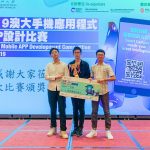 Li Junfei, Chen Guanhua, and Zhang Weijian
Li Junfei, Chen Guanhua, and Zhang Weijian
Three students of the University of Macau (UM) recently developed a practical mobile interactive applet called ‘UMor’ for their teachers and classmates. Users can obtain useful information through the ‘chat’ function. The applet can also be applied in the tourism industry.
UMor was developed by Chen Guanhua, Li Junfei, and Zhang Weijian, fourth-year students in the Department of Computer and Information Sciences. It won the first prize at the 2019 UM Mobile APP Design Competition. The three students’ original goal was to use the professional knowledge they learned at UM in the past four years to develop a practical programme.
In order to ensure a better experience for users of different mobile phone systems, the trio developed Umor as a WeChat applet. The advantage is that users can ask questions about the UM campus, including the arrival time of the school shuttle, the locations of the bus card top-up venues, and the locations of the restaurants on campus, and obtain text answers instantaneously. UMor is also connected to UM’s open data application interface platform, and can display power consumption, power consumption trends, and related forecasts of multiple buildings on campus.
In order to design UMor, the students had to learn WXML language for WeChat, which took them a lot of energy and time due to the complexity of server database maintenance.
Chen came up with the idea of UMor. He has been participating in research on natural language processing under the guidance of Prof Wong Fai since last summer. In the process, he gradually realised that ‘designing a programme to simulate human behaviour is very interesting.’ Li, who is responsible for periodically checking user feedback, says that they are using machine learning algorithms to collect more questions from users.
Recently, the three students tried to optimise the user interface and content of UMor, and they discussed these issues at home via WeChat. They hope that Umor will include more data, such as water consumption data, with more extensive applications beyond UM. They also hope to develop additional functions, such as voice recognition and automatic reply, to enable the programme to ‘understand and speak’.
With graduation on the horizon, the three plan to continue to pursue a master’s degree in information technology. Li hopes to become an interaction designer. Zheng intends to pursue research on natural language processing. Chen says that in addition to continuing to explore natural language processing techniques, he may also write some programmes about education or translation.



